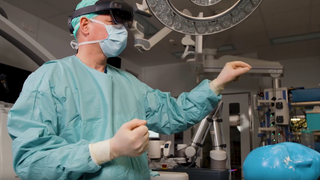Boldyn wins Leading Lights Award for project Hola 5G Oulu
The judges said it best: this wasn’t “just another fast network story”- it was a bold leap into the future of healthcare.
12 September 2025 | Oulu, Finland
Boldyn has clinched the 'Outstanding Use Case: Driving Digital Transformation' award at the prestigious Light Reading Leading Lights Awards. The winning project? The revolutionary Hola 5G Oulu initiative, which is redefining the future of healthcare.
The Hola 5G Oulu project marks Europe’s first private 5G network deployed in a live hospital environment, tested in high-stakes scenarios including patient wards and surgical theatres. Installed at Oulu University Hospital (OYS), the network delivers ultra-reliable, interference-free connectivity across patient wards and surgical theatres, introducing a new era of smart, responsive care.
Traditionally, up to 50% of doctors’ and nurses’ time is spent on computers, with manual data handling causing delays, errors, and rising costs. Hola 5G Oulu flips that paradigm by integrating wearable wireless tech and AR smart glasses, clinicians can access real-time patient data directly at the point of care. Freeing them to focus on patients, accelerate treatment, and improve outcomes.
Key Innovations:
- Private 5G standalone network: Ensures seamless, secure connectivity, even during blackouts
- AR Smart Glasses: Deliver live patient data to clinicians in surgical theatres and wards
- Voice Communication Headsets: Enable instant coordination across hospital wings
- Wing-to-Wing Coverage: Eliminates fragmented communication and boosts operational efficiency
Powered by collaboration
We led the charge alongside a visionary consortium: Oulu University Hospital, Pohde, University of Oulu, and WICOAR Technologies. Together, they’ve built a blueprint for digitally transformed healthcare - one that’s scalable, sustainable, and deeply human-centric.
Financiado por la Unión Europea
Financiado por la Unión Europea. Sin embargo, los puntos de vista y opiniones expresados son únicamente los de los autores y no reflejan necesariamente los de la Unión Europea o de la Agencia Ejecutiva Europea de Salud y Digital (HaDeA). Ni la Unión Europea ni la autoridad otorgante pueden ser consideradas responsables por ellos.

